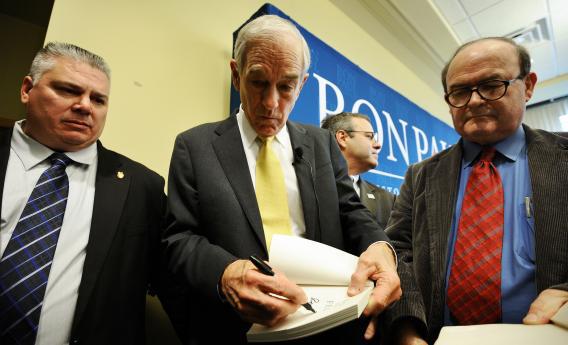A very short timeline:
- Nearly five years ago, the New York Sun criticized Ron Paul for an item in his old newsletter, the Ron Paul Political Survival Report, which called “the Israeli government” the “most powerful lobby of the bad sort.” I asked Paul about the item. “I’d have to have you show to me that I wrote it because that doesn’t sound like my language, and in campaigns, some things get into newspapers that aren’t actually correct,” he said. “There were some things in a newsletter that wasn’t actually written by me, so sometimes that gets a bit of distortion.”
“Some things.”
- In January 2008, James Kirchick wrote a long expose of the content of Ron Paul’s old newsletter, the “Ron Paul Political Survival Report.” A short while later, I asked Paul to respond to the article, and the racist quotes that had appeared in the newsletter. “I don’t even have copies of them, because it’s ancient history,” he said. He said he didn’t write the quotes in question. He talked to Wolf Blitzer later that day, answering more fully.
“Have you ever heard a publisher of a magazine not knowing every single thing?” he said. “The editor is responsible for the daily activities. People came and gone. And there were people who were hired. I don’t know any of their names. I absolutely honestly do not know who wrote those things.”
“These things.”
The newsletter story died out, even as Paul kept running for the GOP nomination, because he had no chance of winning anything. In countless 2011 presidential debates, the issue never came up. Paul had years to formulate a response to an issue that could come up again.
Instead, he sniped at CNN for asking about it, and left an interview, tearing off his mic.
“Congressman won’t talk about 1990s vintage racist quotes” is one story. “Congressman bails on interview” is another. Sorry, this is how the media works – our self-love mandates that we obsess over moments like these. The Bolger blow-up generated headlines like “Ron Paul Blames People Like You For Questions About His Racist Newsletters” (Comedy Central), “Paul Walks Away” (Time), “Don’t Ask Ron Paul About His Racist Newsletters” (New York), etc and etc.
For Ron Paul fans who weren’t bothered by the content of the newsletters – by which I mean they agree with me and Julian Sanchez, that he simply made a mistake by allowing some allies to write crap in his name – there was always a meta-problem with this story. It was an executive decision problem. How good a manager could Paul be if he let this stuff go out under his name? We have a new meta-problem. How could Paul possibly spend 2008 to 2011 building up his national profile, totally aware of the newsletter story, and not come up with a better response? I mean, it’s not like reporters are presenting him with new material. Most of them are hitting CTRL+C on Kirchick’s old story. How could he still bungle it?
I think I know the reason. Here’s a statement or answer Paul could give to end the story. There’s one hole in it.
For several years in the 1980s and 1990s I published two newsletters about politics and investment advice. To my regret, from time to time I published racist and conspiracy-laden content, and signed my name to it. I don’t recognize any of the phrases in these letters, and that’s because I hired people to write them then paid no attention to what they wrote. I’m still friends with some of the people who worked on these newsletters, and I’m asking them…
This is where I trail off, because this is the story-ending decision that Paul won’t make. In 2008, Julian Sanchez and I explained the moment in libertarian history that these newsletters came out of, and how some of Paul’s allies, like Lew Rockwell, talked openly about the need to win over “rednecks” to the cause. Neither Rockwell nor Paul has ever grappled with this in public. It’s old news, so they feel they shouldn’t have to. In 2008, Rockwell even defended the content of Jeremiah Wright’s sermons against the “reich-wing” media. These aren’t guys who believe that they, or anyone else, should have to scrape and apologize for everything they’ve been associated with.
But Paul isn’t giving an answer on the newsletters that could possibly end the story. He’s annoyed about being asked uncomfortable questions? Who cares? News flash: The media doesn’t just want to run fun pieces about how great your best ideas are. No one, in any kind of public life, could get away with publishing content under his own name then saying he had no idea who wrote it. He obviously has some idea. Will he have to admit that he’s still friends with the people who wrote it? Will he have a story about how he ostracized those people? Either one of those admissions would answer the questions.
